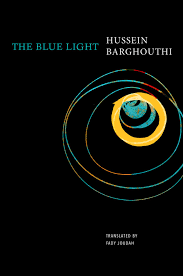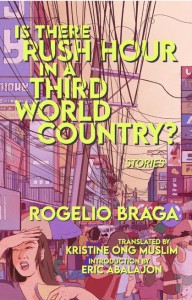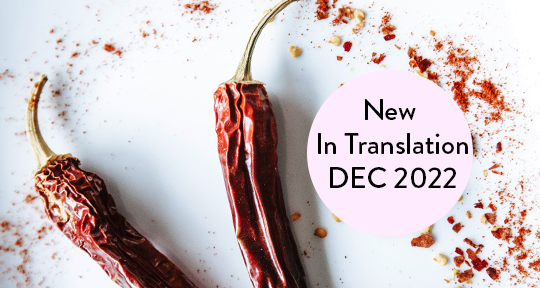This week, we’re proud to present two brilliant publications from authors Hussein Barghouthi and Rogelio Braga. From the former comes a wondrous autofiction that uses the vehicle of a companionship to explore philosophies of life, memories, country, and conversation. From the latter, a vivid collection that examines the various intersections and conflicts between life and work, concentrated in the electrifying, volatile urbanity of rush hour. Read on to find out more!

The Blue Light by Hussein Barghouthi, translated from the Arabic by Fady Joudah, Seagull Books, 2023
Review by José García Escoba, EaL for Central America
Hussein Barghouthi’s The Blue Light is the story of a Palestinian writer also named Hussein, as told through his relationship with Bari, a Turkish American Sufi. Though their lives come to be somehow intertwined, one can hardly think of Hussein and Bari as friends. They’re acquaintances. They may, objectively, care for each other. There are signs of concern, empathy, and camaraderie. Solidarity, even. Pity. The connection between them is not a simple development of shared experience or mutual interest, but forms from the fleeting yet memorable encounters between the two, wherein our protagonist learns about life, the meaning of life, life after death, addiction, the mind being “an expansive entity,” and other philosophies.
—What’s the mind? I asked.
—The mind? Oh, man, it’s horrifying. See. . .
He gestured to the neon light, asphalt, skyscrapers, the pier, the closed supermarket, the university library, and said, “That’s the mind.”
Hussein, the protagonist, is a Palestinian writer who grew up in Lebanon, and goes on to study Comparative Literature at the University of Washington in Seattle. Bari, on the other hand, is an elusive figure, introduced as “that Sufi from Konya.” His theories and messages are cryptic and mysterious at best, often escalating into the contradictory and nonsensical. “He wants to control my mind. He might even be a secret agent,” Hussein writes. Nevertheless, their interactions are always memorable, filled with tension, sarcasm, empathy, and dry humor—somewhat reminiscent of Richard Linklater’s Waking Life. Within the novel’s dialogues, its characters discuss philosophical issues such as death and reincarnation, lucid dreams, the meaning of life, the meaning dreams, religion, and so on; not in an academic way, but in the discursive, organic way of friends.
On one occasion, Hussein and Sufi play chess, and their conversation veers from the meaning of Bari’s name, to the duality of bodies (mental and physical), to Arabic poetry, to Palestinian culture, and on. Eventually, however, Bari’s critical theories and aimless monologues veer into the territory of indoctrination. At one point, he asks Hussein to watch the water fall from his shower. Hussein does as he’s told, and additionally writes a poem about the experience of watching the water. “To hell with poetry,” says Bari. “Watch the water.”
Sometimes Bari is absurd, unorthodox, and silly; his thoughts are not unlike fortune cookie wisdom. But other times, he is sharp, poetic, critical, and devastating, and this multiplicity is a testament to Barghouthi’s skill in rendering his characters alive. The uneven interactions between Hussein and Bari create a unique dynamism to their respective complexity. Bari’s not a master, Hussein’s not an apprentice, and both are flawed—but the two learn from one another other, challenge one another, go against one another’s wishes, and complement one another despite Hussein’s initial indifference. “I wasn’t concerned at all with Bari or his world, didn’t even register it as a world to begin with.”
But it’s not just chit-chat. Hussein’s interactions—with Bari and other characters like homeless Lewis, friendly Suzan, and trash collector Don—serve as pathways into his life, his memories, and his own wandering psychology. In both its physical detail and its cerebral depth, The Blue Light can be seen as an autobiographical novel; Barghouthi also spent his childhood in Lebanon, was also fascinated by nature and words, lived in Hungary, and earned two degrees from the University of Washington. Early on, we learn about Hussein’s childhood in Beirut and how he snuck out of his bedroom to go to the local movie theatre, the way he admired the local landscapes, or when he first saw an elevator. Hussein also shares his take on the Lebanese Civil War and the occasion in which American Marines “evacuated” him and his family:
I looked down through the plane’s window and noticed small red and white buildings like Lego pieces interspersed with black, winding streets and little colorful cars running through them. I loved Beirut in that moment, imagined it as a city for children. I wanted to disembark and play in it.
We follow Hussein to Hungary, and then to Palestine on a visit in 1975. We see him when he arrives in Seattle, the thoughts he had when his father passed away, and the time he married “a woman with schizophrenia.” As we track Hussein’s journey, we take many incursions into his thoughts—about the Israeli occupation, about Palestine and its culture, about family, memory, and religion. Much like memory itself, The Blue Light does not have a linear structure or clear, definitive answers. There are ideas inside ideas, stories inside stories. When Hussein first starts writing, we are given his draft of a satirical tale called “The Story of the Rock”:
I received a real rock in the mail. One cubic meter of stone. “Incredulous.” A post office slip from East Jerusalem said that I had a package. When I got there I was told by the staff that it would cost me twenty thousand dollars. “Say what?” Yes: one dollar plus another plus another to twenty thousand. I thought about walking away from this clowning around, but it occurred to me that the cost likely indicated an extraordinary content.
All roads, however, lead back to Bari and his perplexing ideas.
I asked him how he passed the time in the world of the margins. He said: “I am busy building a small spaceship for one passenger and I will use it for travel when my time on earth is up. I’ll head to the stars in deep space and won’t return.”
At times sordid and bitter, at times truly inspiring and uplifting, The Blue Light is a dense yet illuminating book of fascinating conversations, thought-provoking ideas, arresting descriptions, and nuanced political commentary. Additionally, the novel’s cyclical nature—“its several beginnings and many returns”—contribute to its motion and elasticity. Childhood and innocence are often paired with tragedy and devastation. Mystery sits alongside absurdity. Beauty, chaos, and thinking frame and define this novel. The Blue Light is a brilliant meditation on memory; it’s dizzying and idiosyncratic, and immensely creative, and unprecise, which leads me to the book’s final thought:
Some French artist once said that precision is not the truth. And I say, don’t ask precision or chronology of me, because time is for those who possess organized knowledge of when some thing occurred. . . The heart rearranges its furniture according to the importance of events as the heart deems it. The heart couldn’t care less about the system of dominant time or the system that time should dominate. And precision, as far as my experience with Bari is concerned, will lead only to nonsense.

Is There Rush Hour in a Third World Country? by Rogelio Braga, translated from the Filipino by Kristine Ong Muslim, The 87Press, 2022
Review by Daljinder Johal, Assistant Managing Editor
In Rogelio Braga’s collection of short stories, Is There Rush Hour in a Third World Country?, the answer to the titular question is self-evident—of course there is! As the introduction from Eric Abalajon tells us, it is not uncommon for one to imagine developing countries (seen through the lens of Hollywood) in scenes of traffic-congested cities. However, as Abalajon hints at, there is something beyond typical depictions of this “Third World sensory ordeal.” Within this dusty and polluted intersection between work and life, Braga has little interest in telling simple stories of starlets or superheroes, opting instead to use this particular space to examine everyday people, simply going about their business.
Work is the most pervasive element linking these stories—or rather, labour. Braga deals with familiar themes of people trying to find meaning in life and in work, using both time and space to examine this pursuit. We often see young people through their cross-generational relationships—a useful means for understanding how work affects one’s bonds and identity throughout their personal and familial history. The benefit of looking at rush hour, rather than merely places of work, is that it allows Braga to venture beyond common examinations of sanitised office spaces and their repeated drudgery. Instead, we see environments of labour as live, volatile spaces. There are outside forces creating unexpected instability, actions inciting change to self-image or familial relationships. Often, Braga goes beyond the confines of white-collar walls, opening narratives of work as the means of survival, including sex tourism and migrant labour in Dubai.
The first story sets the tone for this. In “Bona Bien,” the young and educated Soledad wins herself a post-graduation job at the All Filipino Life Insurance Corporation, and strikes up a friendship with Bona, a long-term employee. Sparked by an accidental run-in at the dialysis centre where Bona’s daughter, Michelle, receives treatment, their companionship evolves until Soledad becomes a regular visitor to the centre, and the two “would chat all day as if the two of us were not in the same office during weekdays.” However, the infrastructure of their relationship becomes an obstacle, as Soledad realises: “Bona was the only thing keeping me here. I was worried about her losing her job, and what that would do to Michelle’s dialysis treatment. I spent sleepless nights agonising about Bona and her family.”
Yet, while Soledad worries for Bona, she doesn’t have the means to bridge their divide: a societal hierarchy between the older, union-based generation who are considered “useless rank-and-file employees” in an “old system” from the government, versus the young, “competitive individuals” who form the management. The precarity of their working environment ultimately places them as antagonists rather than comrades. When a series of events leads to Bona’s redundancy and further personal pain, Soledad receives an official offer of promotion after a key meeting with Bona. Rejecting the promotion, she tells us:
I quit my job at All Filipino Life Insurance Corporation that same day. I headed straight to SM Megamall to watch a movie which starred a Hollywood actor who was a favourite of mine and Bona’s. Alone in the cold movie theatre, I told myself that life was short. Really short.
Similarly, in “Piety in Wartime,” Imo and Wanda are two young children who live near the Pasig River, but under very different circumstances. With the constancy of dead bodies in its banks and the risk of bombing, the war between the United States and China means that the two are constantly surrounded by death. While parents of the community purportedly accept this responsibility, the true difficulty of the situation is the “Beijing Government’s Comprehensive Family Planning Program,” which sees biological children like Imo being seized for distribution to other families. In comparison, Wanda feels bereft, left only with the bombed ashes of her biological parents and having to find her own solace—rather than an official adoption—with an elderly woman. Her caretaker eventually dies of cholera after supposedly having drank from the Pasig River, and, as Wanda mourns, an old woman from Sanctuario offers a hug and worlds of comfort:
“Hay, Wanda, stop crying… don’t worry, she died for you. Someday, you will understand everything… they can’t take our histories from us because the death of one… preserves our memories.”
In this, we see the importance of love and connection, but even more importantly, there is the suggestion that work—or the consequences of work, such as war—is unable to denigrate what these connections ultimately create: a wider collective memory. The idea of this solidarity is further reinforced when, after Wanda’s death, Imo visits the old man responsible for looking after the community’s deceased, and he contextualises Imo’s relationship to Wanda:
“Look at it this way, Imo: Wanda died, not her memory. Time will come for the next generation, and they will know that at one point, there was a Wanda—not an ‘official Wanda’ of the Beijing Government. They’ll never forget, especially your future grandchildren, that you and Wanda were friends.”
As an unflinching and challenging look at a country’s history and its people struggling for survival, Braga brings compassion and complexity to this urban space where the professional and the personal intersect, culminating in rich stores of love, connection, and memory—and what they mean to us as both individuals and members of communities.
*****
Read more on the Asymptote blog:

